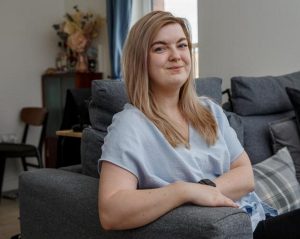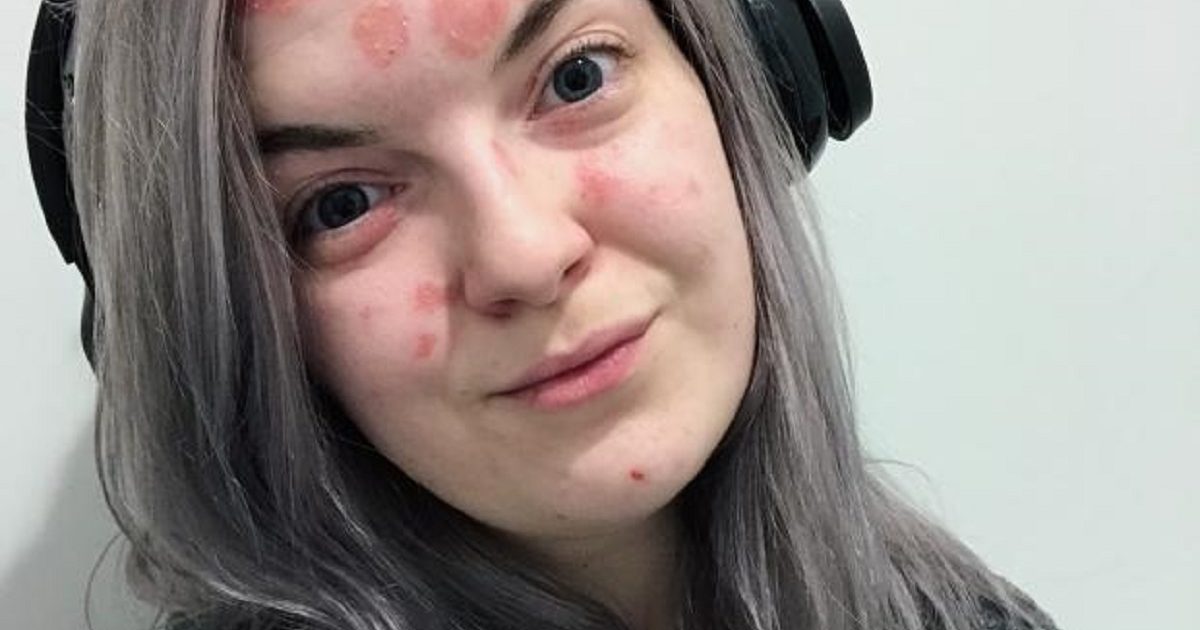Scotland Woman Calls Out Psoriasis 'Bullies' Who Giggle At Her Skin Condition
- 29 year old Jude Duncan of Glascow, Scotland battles severe psoriasis that leaves red, flaky blotches on her skin
- She says those who stare and giggle at her condition are just "bullies" living through an "Instagram filter."
- Duncan is speaking out during Psoriasis Action Month, educating others to treat psoriasis suffers with kindness and understanding.
- No cure for psoriasis, but a range of treatments can improve symptoms and appearanc
29 year old Jude Duncan of Glasgow, Scotland battles psoriasis that leaves red, flaky blotches on her skin that form scales so painful sometimes she struggles to walk. But she says those who stare and giggle at her condition are just "bullies" living through an "Instagram filter."
Read More "For a long time I was depressed and anxious because of it. I just hid away from the world because of it," she told the Glasgow Times. "It was also sore and irritating. I could wake up with blood on my pillow if I scratched it in my sleep. The more depressed I got about it the worse the condition got. It felt like a vicious cycle." The 29 year old says she's struggled with psoriasis for nine years. She first noticed a small patch appear on her forehead before it took over around 40% of her face.
"For a long time I was depressed and anxious because of it. I just hid away from the world because of it," she told the Glasgow Times. "It was also sore and irritating. I could wake up with blood on my pillow if I scratched it in my sleep. The more depressed I got about it the worse the condition got. It felt like a vicious cycle." The 29 year old says she's struggled with psoriasis for nine years. She first noticed a small patch appear on her forehead before it took over around 40% of her face."I couldn't put on a foundation to cover it up so it was pretty visible and people would stare," she said. "If I went on dates I would need full blown conversations about it before it, and if I didn't I would get some nasty comments."

Duncan believes her condition may have been triggered by the stress of her fourth year at university and writing her dissertation. She's now on medication which has helped to clear up her skin and reduce her symptoms.
"It took me a long time to be comfortable and happy in my skin. It is something I am going to have to keep working on," she said.
Part of her work includes speaking out during Psoriasis Action Month, with the goal of educating others to treat people with visible differences with kindness and understanding.
"Now I am working to raise awareness. Just because someone looks different from you doesn't mean they are infectious or have something wrong with them," she said.
Duncan has become more confident about her condition, which in the past has left her feeling embarrassed and isolated.
"The first couple years I was really insecure and ashamed of it. It became all-consuming because I worried about what people thought about my patches," she said. "On the flip side though I found this amazing online community who related to me and I made great friends. It helped me build up my resilience."

Psoriasis Triggers
Managing stress and relaxing your body is important, but certain types of food and drink, along with tobacco, can be huge culprits for triggering autoimmune conditions. For some, the sun will exacerbate symptoms. Salt water from the ocean, however, can be good for clearing up skin conditions.
Also, eating an anti-inflammatory diet can reportedly help immensely for controlling flare-ups. Some people with psoriasis try to combat its distressing effects by following a paleo diet. A paleo diet, by definition, mainly consists of meat, fish, vegetables, and fruit, and excludes dairy or grain products and processed food.
According to the Paleo Diet website, "Foods that cause inflammation include refined carbohydrates, wheat and other cereal grains, soda and other sugar-sweetened beverages, margarine, shortening and lard, and processed meats."
These types of foods can cause insulin (a hormone that controls our blood sugar) to spike in our bodies, which can contribute to inflammation and also alter our gut health, meaning change the ration of good bacteria vs. bad bacteria, which can wreak havoc on the body.
Overall, getting an adequate amount of rest and 7-8 hours of sleep every night is a tried and true method of putting less stress on your body, therefore lessening the severity of certain conditions like psoriasis.
Is It Contagious?
Some skin infections such as staphylococcus (staph) can look like psoriasis and they can be contagious. However, psoriasis itself is not an infection and it is never contagious.
So if you have this condition or if a loved one does, there is no reason to be concerned about it being spread from person to person. If you’re swimming, hugging, or playing a contact sport with someone who has psoriasis, you don’t need to be fearful about getting this condition too.
Treating Psoriasis
If lifestyle changes are not doing the trick, or if you are unable to incorporate them during a highly stressful time, some psoriasis patients can reduce the severity of their flare-ups by using a topical solution. Still, many times treatments applied to the skin's surface just aren't enough to clear stubborn psoriasis. That's where systemic treatment treatment that travels through your entire body rather than being aimed at one area can be beneficial for patients. Systemic treatments are available via oral medication and injections. Some have been around since the early '70s, while others are relatively new to the landscape.
"I have patients who come in after having been to many other medical practices and not really getting much hope or really good treatments for their psoriasis," Dr. George Han, a dermatologist at Northwell Health/Lenox Hill Hospital, explains to SurvivorNet. "And we'll give the patient a systemic medicine that these days are very effective. We have treatments where over half of the patients who have moderate to severe psoriasis are getting 100% clear."
"I have patients who come in after having been to many other medical practices and not really getting much hope or really good treatments for their psoriasis," Dr. George Han, a dermatologist at Northwell Health/Lenox Hill Hospital, explains to SurvivorNet. "And we'll give the patient a systemic medicine that these days are very effective. We have treatments where over half of the patients who have moderate to severe psoriasis are getting 100% clear."
Psoriasis can start at any age, but most often develops in adults between 20 and 30-years-old and between 50 and 60-years-old.
It affects men and women equally, and there’s no cure. But a range of treatments can improve symptoms and the appearance of skin patches.
For some it’s just a minor irritation, but for others it can have a big impact on their quality of life.
"My advice to anyone dealing with psoriasis would be to just be gentle with yourself. You’re already going through a lot but the condition doesn't define you."
She also says words matter.
"Try and say positive things - like if you did good self-care or find something you like about yourself."
Going forward, Jude is focusing on accepting her psoriasis in an effort to be "happy and comfortable" in her own skin.
Learn more about SurvivorNet's rigorous medical review process.


